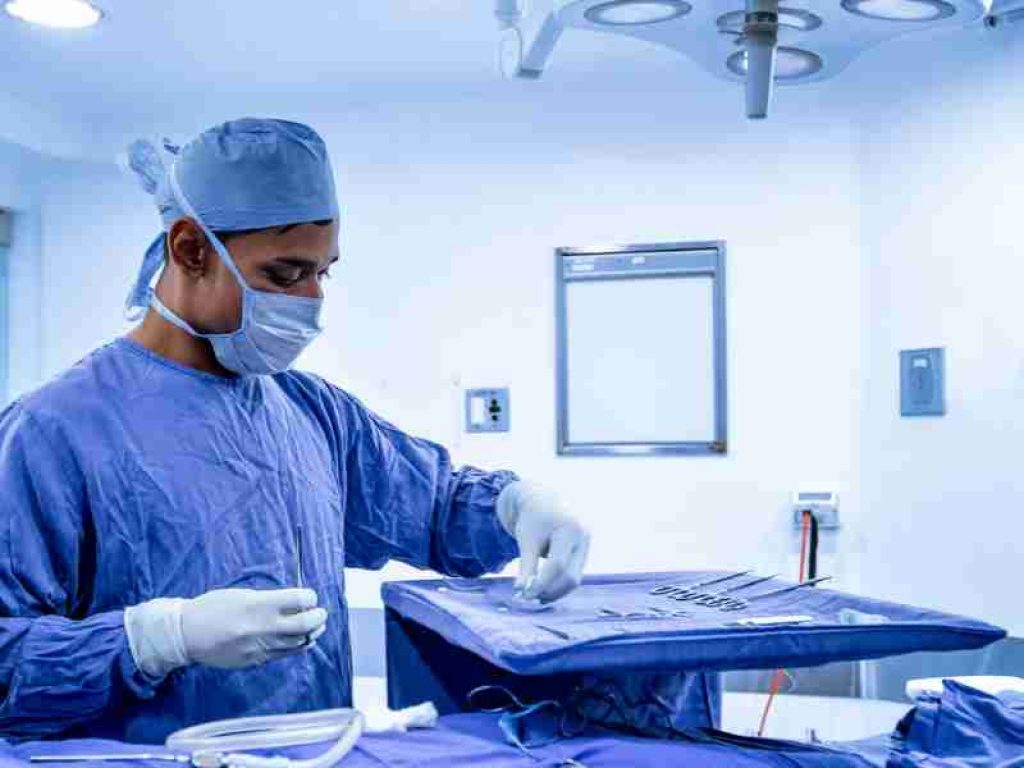
What Is A Surgical Nurse Practitioner?
This career guide will educate you on all you need to know. What is a Surgical Nurse Practitioner? What are the steps to taking a surgical nurse practitioner program? Include typical start-up times, educational needs, certifications, daily tasks, etc.
What Is a Surgical Nurse Practitioner?
Surgeons often enlist the help of registered nurses with advanced nursing degrees, known as surgical nurse practitioners (SNPs). Before, during, and after an operation, surgical nurses help surgeons and patients in many different ways.

One of the most crucial considerations to remember if you’re considering a career as a surgical nurse is the difficulty of the work. Registered surgical nurses are also known as preoperative nurses at many hospitals because of their expertise in preparing patients for Surgery.
It’s common for surgical nurses to work in settings that accept Medicare differently. They operate in various settings, including outpatient clinics, doctor’s offices, and hospital surgical departments, so a breadth of knowledge and dedication are essential.
What Are Some Surgical Nurse Specializations?
When earning your MSN, you’ll focus on surgical nursing. Surgical specializations include, for instance:
- General Surgery
- Neurosurgery
- Orthopedic procedures
- ENT (Ear, Nose, and Throat) Surgery
- Pediatric Surgery
- Cosmetic procedures
- Transplantation surgery
- Vascular or cardiac Surgery
What Does a Surgical Nurse Practitioner Do?
Surgeons rely heavily on surgical nurse practitioners, who play various hands-on roles throughout procedures, from opening incisions to operating laparoscopic or arthroscopic cameras and suturing patients’ wounds. Depending on their expertise, surgical nurse practitioners can assist with any procedure, from life-saving trauma surgery to intricate tumor removals to cosmetic plastic surgery.

Surgical nurse practitioners are the unsung heroes of the operating room, providing patients and their loved ones with ample surgical care and attention pre- and post-surgery while surgeons are buzzing around in a frenzy.
- Have pre-op consultations with patients to answer questions and calm nerves
- Helping doctors perform crucial manual labor in the operating room
- Keeping an eye on patients’ vital signs before, during, and after Surgery
- When required, administering medication
- Postoperative consultations with patients and their families to discuss postoperative expectations and timetables
What qualifications are necessary to work as a surgical nurse practitioner?
A wide range of abilities is required for a career as a surgical nurse practitioner. Technical proficiency and interpersonal, organizational, and self-improvement abilities are necessary. Below is a list of the top five abilities any surgical nurse practitioner (NP) should have.
Teamwork:
To be successful in almost any field, you need to be able to work well with others. Your work as a surgical NP relies heavily on communication and cooperation with other healthcare team members, such as the nurses and the doctor, to accomplish goals like getting the patient to Surgery on time and providing postoperative care and education.
Or it could be between the surgeon and the nurse or receptionist in charge of setting up the patient’s schedule for pre-and postoperative care. It requires a team to care for patients, and your ability to collaborate with others affects both the quality of care provided and the degree to which the patient is satisfied.
Effective Communication:
Effective communication and teamwork are crucial for providing quality patient care, as poor communication can directly affect the level of care received. It is also imperative to communicate in a way that benefits both the patient and their family.
Examples of communication in a surgical NP’s work include pre-surgical instructions, postoperative instructions, diagnosis information, and administering medicine. However, strong communication skills are essential for this job.
Seeking Professional Development:
For surgical nurse practitioners, ongoing education is vital to advance in their profession and achieve success. Consistently working toward self-established objectives is necessary and can involve setting annual goals with one’s manager through open communication. Attending conferences, continuing your education, and staying current on best practices are all ways to accomplish this.
Technical Skills:
As a surgical nurse practitioner, you must have strong technical abilities. These abilities include making a correct diagnosis based on a patient’s complaints. Proficiency in interpreting diagnostic findings, comprising laboratory tests and medical imaging, is a fundamental requirement for a surgical nurse practitioner. Additionally, knowledge of wound care and suturing techniques is essential.
Flexibility:
Finally, we will discuss how adaptability is an important quality in a surgical nurse practitioner. In surgery, even a perfectly planned day can spin out of control at the drop of a scalpel. A tardy patient or an unexpected add-on can throw a mighty wrench in the gears, leaving you scrambling to catch up. The stakes are high, and time is money – this is crucial knowledge for any surgical specialty, including general Surgery.
What are the workplaces of surgical nurse practitioners?
Everywhere there are operating rooms, surgical nurse practitioners are needed. Surgical wizards can usually be spotted casting their spells in the confines of hospitals or cutting-edge clinics, but these magical mavens occasionally dazzle urgent-care centers with their prowess as well.
For surgical nurse practitioners, the work clock knows no bounds – while clinics may shut their doors at 5, these dedicated individuals can be found hustling through overnights, weekends and even holidays in hospitals to ensure top-notch patient care.
What are the pros and cons of a Surgical Nursing Practitioner?
Navigating Medicare obstacles may seem daunting for surgical nurse practitioners, but the incredible rewards of helping patients make it a journey worth taking!
PROS:
The world of surgical nursing is brimming with possibilities as job prospects and a bright career outlook await practitioners everywhere!
- Surgical nurse practitioners (NPs) earn some of the highest incomes in the medical industry.
- Becoming a surgical NP offers exciting opportunities for specialization and career growth.
- As a Surgical NP, each day is a thrilling challenge with unique patients and peculiar predicaments. Brace yourself for an exciting and unpredictable career!
- A lifelong career in the medical field. The need for skilled surgical nurse practitioners will never go away.
- The public has high regard for nurses and their profession.
- Employers give bonuses and tuition support to help trainees level up.
CONS:
- A career in the field of surgical nurse practitioners is difficult and time-consuming.
- To work in your field, you must first earn the necessary credentials.
- A surgical nurse practitioner (NP) may work hours not strictly 9 to 5. The working conditions can sometimes be tough, considering the nature of the operating room.
- Be ready for some mental and emotional pressure at work.
- Nurses are legally required to provide accurate diagnoses and surgical care for their patients.
How to become a surgical nurse practitioner?
The following is a detailed description of the prerequisite training, work history, and credentials required to work as a surgical nurse practitioner:

Enroll in a BSN:
A Bachelor of Science in Nursing (BSN) degree from an approved educational institution is the first step in becoming a surgical nurse practitioner. Becoming a registered nurse may seem like a daunting task, but with sheer determination and hard work, anyone can unlock this coveted achievement – nursing school woes and all. Enrolling in Brookline College’s BSN program is a cinch! Simply flaunt your high school diploma or GED with a pounding GPA of 2.5 or better, and crush the ATI-TEAS admission exam with flying colors. Easy peasy!
Get Your Bachelor’s Nursing Degree:
Embarking on a journey to obtain a Bachelor of Science in Nursing (BSN) degree opens the door to endless opportunities, paving the way towards becoming an accomplished Surgical Nurse Practitioner – one of the most sought-after nursing specializations out there! General education classes, including algebra, literature, statistics, psychology, and communications, will be a part of your BSN curriculum.
Even though the courses may not be specifically related to nursing or medicine, they can enhance your communication and problem-solving skills, ultimately impacting your interactions with patients and thinking agility during surgical procedures.
Learning the many facets of nursing will be the primary goal of your BSN program. Some of your lessons will teach you how to perform an assessment on a patient and how to provide surgical care for a wide range of patients. Others will instruct you about pharmacology and the many medications and measurement systems employed in the medical industry. The basis for a successful career as a Surgical Nurse Practitioner is laid by the simulated clinical settings in which you learn to perform various hands-on medical operations.
You will take courses in nursing, but you will also learn about the human body, microbiology, nutrition, and human growth and development. Like any other top healthcare professional, surgical nurse practitioners must thoroughly understand the human body to communicate effectively with patients and guide them through recovery.
You will gain practical experience in a real healthcare setting by completing a clinical capstone program as the final requirement for your Bachelor of Science in Nursing degree. While you will participate in several simulations throughout your nursing education, nothing can replace actual clinical practice where your decisions and actions directly affect the well-being of patients. It would help if you were completely confident in your abilities as a nurse before you could work as a surgical nurse practitioner in a busy operating room.
If you want to become a nurse, you should get your education from a school that uses modern teaching methods and has a history of helping its graduates. It is possible to secure your first job as a registered nurse (RN) even before you graduate from nursing school if your school has a job-placement program for its students.
Get your NCLEX-RN Certification:
In order to become a surgical nurse practitioner, passing the NCLEX-RN exam is required. The test’s duration and number of questions vary based on individual performance, as it is an adaptive exam. Get ready to tackle the ultimate test – with a maximum of six hours, you could face up to 265 questions! But don’t sweat it. If you’re owning every question like a boss, you might wrap up the exam in only 75 questions!
There will be two 30-minute breaks, one at the 2-hour mark and another at the 3.5-hour point, all completely discretionary. If you’re apprehensive on test day, you can benefit from a practice test. These will help you get used to the testing environment and highlight any areas of your BSN curriculum that you should revisit.
Gain RN experience:
After passing the NCLEX, you can apply for a nursing license in the state where you want to practice. The NCLEX is accepted all around the country, which is wonderful news for people who are starting over in their careers. It would help if you looked for work in a surgical setting to become a surgical nurse practitioner in the future. That means searching for employment opportunities in specialist surgery clinics, hospital operating rooms, and emergency rooms.
Keeping your nursing license up-to-date is crucial for staying golden in the healthcare industry. With each state having its own unique renewal process, it’s important to stay on top of things every two to three years. As long as you’re actively RN-ing or keeping up with your education, your license will sparkle like gold!
Earn a nursing degree after high school:
Surgical nurse practitioners must get a master’s degree in nursing, just like all other advanced practice registered nurses (MSN). There are many MSN programs offered by educational institutions that concentrate on surgical science. These programs provide the necessary knowledge and expertise to succeed as a surgical nurse practitioner.
Several educational institutions provide surgical nursing MSN programs, and certain programs enable you to work as a registered nurse while pursuing your master’s degree. The completion time for an MSN degree is typically two years, although accelerated programs can be finished in as little as 18 months.
Get Certification as a Nurse Practitioner:
Most surgical nurse practitioners obtain an ACNP or FNP license from the American Nurses Credentialing Center after finishing an MSN degree. Unleash your potential as a surgical nursing rockstar by gaining ample experience in the operating room – this will qualify you for an exclusive certification from the Medical-Surgical Nursing Certification Board and land you top-tier positions as a surgical nurse practitioner.
What are other Education Requirements for Surgical Nurse Practitioners?
To keep one’s RN or Surgical Nurse NP license, one must complete continuing education units (CEUs). It is mandatory that you earn continuing education credits (CEUs) in accordance with the requirements of your professional licenses and certifications.
You must maintain your RN and NP licenses to work as a surgical nurse practitioner. To ensure your RN and APRN licenses remain valid, renewal every two and five years respectively is typically required in most states. The state also imposes CEU requirements for these licenses.
To keep your NP license, it is necessary to fulfill a stipulated number of hours in a specific area related to the prescription of opioid medications, including pharmacology. Completing Continuing Education Units (CEUs) is mandatory to maintain your credentials. For instance, the Medical-Surgical Nursing Certification renewal every five years necessitates CEU fulfillment.
What is the average salary range for a surgical nurse practitioner?
According to recent estimates, the annual salary for a surgical nurse practitioner is around $102,222, though this amount may vary based on years of experience in the field, particularly as a surgical nurse practitioner.
Are there job opportunities for surgical nurse practitioners?
As surgical operations are now safer than ever, more people have them done to treat a wider range of illnesses and injuries. More surgeries indicate a greater demand for surgical nurse practitioners. The Bureau of Labor Statistics (BLS) doesn’t break out specifics for surgical nurse practitioners regarding employment.
Still, they predict a tremendous 45% growth in the number of nurse practitioners overall in the coming decade, compared to the average growth rate of all jobs, which is roughly 4%. A career as a surgical nurse practitioner offers one of the finest long-term job prospects in the healthcare industry.
FAQ’s
What differentiates a surgical nurse from an OR nurse?
A Registered Nurse who has received training to help surgeons in the operating room is a surgical nurse, sometimes a perioperative nurse, an OR nurse, or a scrub nurse. They provide pre-, intra-, and postoperative care for patients undergoing both emergency and elective surgical procedures.
Can surgical nurses perform Surgery?
Surgical operations cannot be performed alone by nurses. Before, during, and after surgical procedures, nurses can play a variety of functions. To land your desired job, consider getting further training or education.
What’s the duration of becoming a surgical nurse?
Earning an ADN or a BSN requires at least two years of study before becoming a surgical nurse. A master’s degree in nursing (MSN), which takes six years to complete, is required to work as a nurse practitioner. You must have worked as a surgical nurse for at least 2,000 hours to get certified.
What kind of nurse is qualified to perform Surgery?
In addition to helping during Surgery, a surgical nurse may also be tasked with caring for patients in the perioperative, postoperative, and critical surgical care settings. A surgical nurse frequently helps patients before, during, and after Surgery in the following ways: Provide the patients you’re caring for some much-needed moral support.
What are the 4 core precepts of surgical nursing?
The four nurse ethical principles guide this solemn responsibility. These values are autonomy, beneficence, justice, and non-maleficence.







